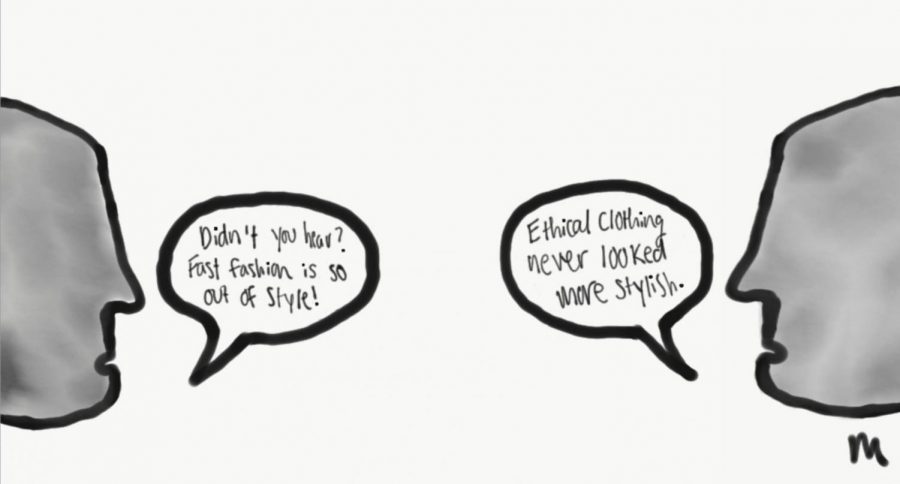Op-ed: Fast fashion companies need to stop hiding behind performance activism
Illustration by Madison Boudreau Popovic
Some question the sincerity of activism performed by large companies.
November 25, 2020
In the months leading up to the 2020 U.S. election, social media apps I regularly use aggressively encouraged young people to exercise their right to vote. These apps provided links to voter registration websites and directions to the nearest polling stations. Some companies extended this civic activism beyond social media, like making merchandise related to voting. I used to appreciate the corporate encouragement, but the other day, I began to have second thoughts about the process when I was window-shopping on Newbury Street.
When I stopped by Urban Outfitters, I noticed a QR code displayed on the store window that led to a voter registration website when scanned. My first thought was that this was promoting something good — if you have to wait in line to get into the store, you might as well do something beneficial while waiting, like registering to vote. The more I thought about it, however, the more I began to realize the inherent hypocrisy of Urban Outfitters and the performative activism of most large companies in general. For example, while Urban Outfitters is embracing civic engagement, it still promotes fast fashion and causes environmental degradation.
“Fast fashion” is a label applied to the production of huge quantities of cheap and trendy clothing, modelled after high-end fashion. The clothing is quickly produced to satisfy consumer demand, but it is also quickly trashed to make way for the next trend. Fast fashion textile production is one of the biggest polluters in the world, second to oil production. Clothing and textile industries deplete non-renewable resources, and they emit huge quantities of carbon dioxide and other greenhouse gases, while using massive amounts of energy, chemicals and water.
Standing outside that Urban Outfitters window, I reflected that the store’s sale of fast fashion was only a part of their ignorant past, considering they were accused of having racist store policies. Their attempts at civic engagement seem performative in retrospect. It appears more like an effort to appear “woke” and protect their brand rather than an earnest attempt to do good. This line of thinking seems realistic considering that Urban Outfitters markets an “Eco Living Collection,” but there is no evidence to indicate that they have actually modified production to reduce their use of hazardous chemicals and amount of waste.
It is disappointing that, after years of research showing the increasing rate of environmental destruction, there are so few brands embracing corrective measures. Patagonia remains one of the few clothing brand “alliances” actively working to reduce its carbon footprint. They have donated over $89 million to grassroot environmental groups through their 1 percent self-imposed tax. But it is not enough to slap “VOTE THE ASSHOLES OUT” tags on clothing. We need budget-friendly ethical brands that actually engage in environmental sustainability, or else their other attempts at social activism are performative at best.
Maeve Singer is a first-year computer science and environmental science combined major. She can be reached at singer.ma@northeastern.edu







